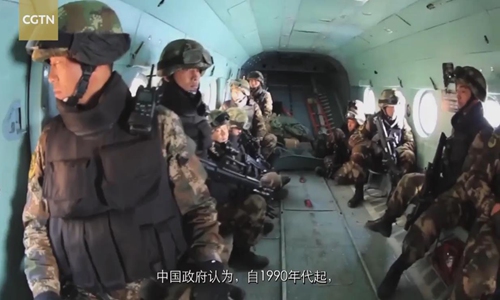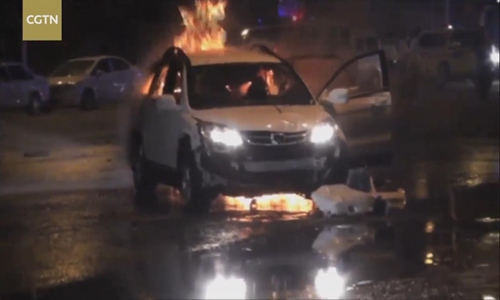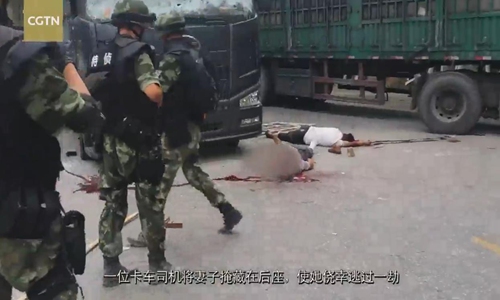HOME >> CHINA
Documentary with rare footage chronicles China's arduous fight against terrorism in Xinjiang
By Liu Xin and Fan Lingzhi Source:Global Times Published: 2019/12/5 22:07:13
China showed overall counter-terrorism work in its northwestern Xinjiang Uyghur Autonomous Region and released rare video and audio evidence of previous terrorist attacks that happened in the region in an English-language documentary on Thursday.
The nearly one-hour-long documentary, Fighting Terrorism in Xinjiang, which was streamed on CGTN, China's state broadcaster, has four parts. It begins with explicating the formative years when extremism began evolving in Xinjiang, followed by the grueling fight against terrorism. It also illustrated the interactions of terrorists with overseas forces accompanied by audio and video evidence. The documentary winds up highlighting international cooperation on anti-terrorism.
Zheng Liang, a research fellow at Guangdong-based Jinan University, who studied Xinjiang for more than 10 years, told the Global Times that he felt "shocked" after viewing the documentary.
Zheng said that previous videos on Xinjiang's anti-terrorism are not specific and well-edited as the Thursday one. "This newly-released documentary uses quite different visual languages adopted by mainstream media."

Photo: Screengrab of CGTN
Severe terrorism threat
The beginning of the documentary features the splendid landscape of Xinjiang, its culture and the different ethnic groups in China, including the prosperous markets and people's peaceful and happy life. Then the scene shifts to depicting the threat of terrorism that is wreaking havoc in the region.
Xinjiang has long been the main battlefield of countering terrorism. According to incomplete data, from 1990 to 2016, Xinjiang endured thousands of terrorist attacks that killed large numbers of innocent people and hundreds of police officers.
The documentary features many video footages of terrorist attacks in Xinjiang, including one in Yining of Ili Kazak Autonomous Prefecture in 1997, which left seven dead and 198 injured.
Urumqi riots on July 5, 2009, which caused 197 deaths and over 1,700 injuries; the 2013 Seriqbuya attack in Kashi, which left 15 dead and two wounded.
Terrorists also orchestrated attacks in other cities of China - they once ramped a car into a crowd in Tiananmen Square in 2013, and another attack that struck the Kunming railway station on March 1, 2014, left 31 dead and 141 wounded.
"Some Western countries spread the idea that the 2009 Urumqi Riots were ethnic clashes triggered by repression. Chinese experts say that's illogical, given the 9-11 attacks. The anti-China interpretation shows the double-standard approach adopted by some countries," narrated the documentary.
Video footage in the documentary clearly captured rioters torching buses and cars on the roads, vandalizing shops and attacking passengers.
Group Captain Sultan Hali from Pakistan Air Force said in the documentary, "What happened in 2009 definitely was not an isolated (incident), because the whole world was gripped by terrorism, especially following the attack on neighboring Afghanistan by the Soviet Union."

Photo: Screengrab of CGTN
Victims of extremism
For extremists, anyone can be a target. The documentary chronicles the story of Dilqemer, who liked dancing but lost her right leg in a terrorist attack that took place in Luntai county of the Bayinguolin Mongolian Autonomous Prefecture on September 21, 2014.
Razye, who was one of the perpetrators of the attack, was also stranded at the spot when the explosion occurred. She lost her right leg and an arm. She and Dilqemer were in the same hospital.
In an interview with the CCTV, she admitted believing "jihad martyrdom is a path to paradise," but now she knows that violence and killing innocents cannot lead one to the paradise.
"I hope others who are tempted to take this path would not succumb like me. My actions left a lovely girl crippled and I lost limbs, too," Razye said.
The documentary also features videos of terrorists killing their peers and assassinating religious figures. On July 30th, 2014, Juma Tayier the chief imam at Kashi's main mosque was stabbed to death. He was also the deputy president of the Xinjiang Islamic Association.
Adudulrekep Tumniaz, President of Xinjiang Islamic Institute was cited in the documentary as saying the terrorists' plan "is to eliminate the prestigious and enlightened members of the religious community. Then they would have no opposition and they would be able to further their conspiracy and achieve their ends."
Most of the terrorists though claim to be loyal followers of Islam, but in reality, they have very little knowledge of the Koran, the holy religious scripture of Muslims.
Murat, who is one of the main perpetrators of the terrorist attack in Hotan on June 16, 2014, could not answer any questions concerning the beginning of Islam, the definition of "jihad" or about the five pillars of Islam.
Li Wei, a counter-terrorism expert at the China Institute of Contemporary International Relations in Beijing told the Global Times that religious and ethnic identities were used by terrorists to advocate extremist views. Under the guise of extremism, terrorism becomes deceptive and seditious, which helps draw young people toward terrorist activities.
On June 6, 2012, Hotan authorities rescued 53 children who were confined in an 80-square-meter room and taught distorted doctrines. Terrorists triggered explosives to hinder police operations. And a suspect jumped off the fifth floor with a 4-year-old child.
The documentary also illustrates the interactions between terrorists in Xinjiang and their overseas accomplices.
The recording reveals that foreign extremists were remotely controlling the actions of the domestic extremists, teaching them how to evade reconnaissance and attack helicopters. Numerous sources have confirmed that the "East Turkistan Islamic Movement" has close contact with terrorist groups.

Photo: Screengrab of CGTN
Working together
Experts believe terrorism is a global threat, and no country can win the war against terrorism on its own. In the face of the threat of terrorism and extremism, Xinjiang has taken a series of measures, including framing laws and regulations and launching effective counter-terrorism operations.
Scrutiny by some Western countries has been constant. But according to the white paper released by the Information Office of the State Council, no terrorism-related incidents have taken place in Xinjiang for nearly three years since the start of the vocational education and training centers.
The complexity of extremism and terrorism makes it hard to tell Xinjiang stories. What is happening there is a test of China's counter-terrorism measures. It's also a way to showcase China's commitment to long-term stability and security in Xinjiang, according to the documentary.
According to media reports reviewed by the Global Times, a special counter-terrorism campaign has been in place in the Xinjiang region since 2014's May.
In total, there has been a crackdown on 1,588 terrorist groups, 12,995 terrorists arrested and 2,052 explosives seized in Xinjiang since 2014, stated a white paper on regional work on counter-terrorism, de-radicalization and human rights protection, released in March.
China has also enhanced international cooperation to crack down on terrorist forces in Xinjiang. China has joined 12 global counter-terrorism conventions and played an active role in international multilateral mechanisms, including the international criminal police organization, Shanghai Cooperation Organization (SCO) and Association of Southeast Asian Nations (ASEAN) Regional Forum.
No violent terrorist attacks have happened in Xinjiang in three years. Publishing these videos would let more people and some Western media know more about China's current counter-terrorism efforts in Xinjiang, Zheng said.
"It seems impossible to correct the wrong opinions of the West toward China's Xinjiang counter-terrorism policies. But the documentary would open a window for those who want to know the truth," Zheng said.
Posted in: SOCIETY